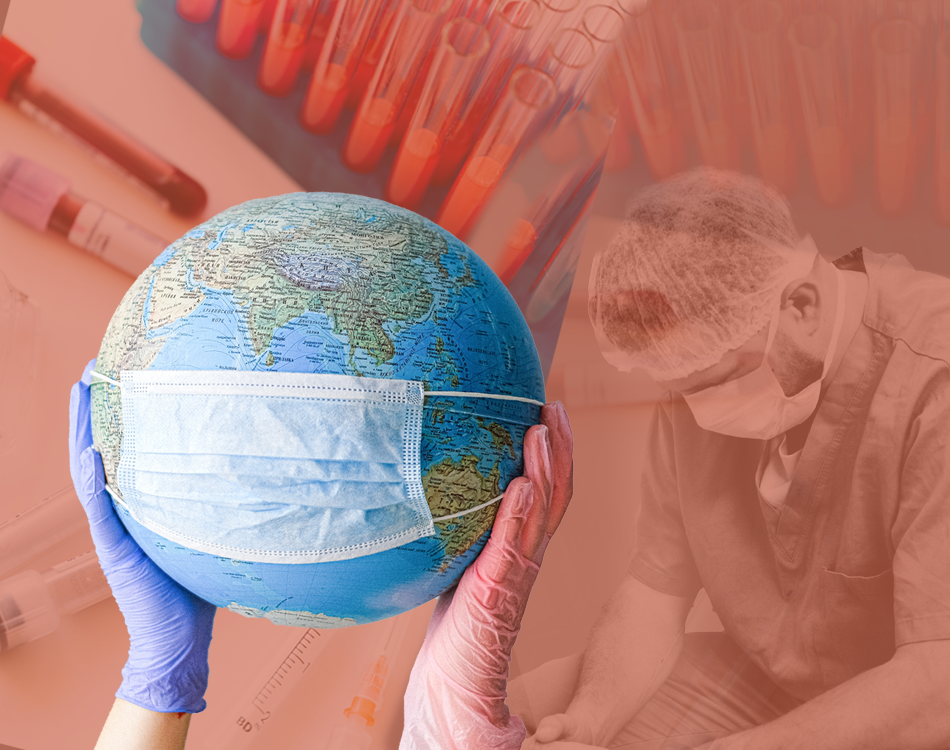
According to a study published in the US Journal of Translational Medicine, COVID-19 infection can result in the production of antibodies against the tissues and organs of the person who became ill months after recovery, even if the disease had few or no symptoms.
Professors of the Therapeutic Clinic of the Medical School of the National and Kapodistrian University of Athens (EKPA), Efstathios Kastritis and Thanos Dimopoulos (Rector of EKPA) report that people infected with a virus produce antibodies to neutralize it. In many viral infections, these antibodies can also have a “toxic” effect on normal tissues and organs, that is, they act as “autoantibodies”. Researchers have known for more than a year that severe cases of COVID-19 can cause a person to develop such “autoantibodies”. In the study from Cedars-Sinai in Los Angeles, the researchers found that the same can happen in less severe cases of COVID19, even for six months after recovery. This deregulation of the immune system, with the production of “autoantibodies” could significantly explain different types of persistent symptoms that have been observed in people who present what is now called “long COVID-19”.
In the study published on 5 January 2022, researchers examined the activity of autoantibodies against 91 autoantigens associated with a number of classic autoimmune diseases in blood samples from 177 unvaccinated individuals (65% women, 35% men, mean age 35 years), who were infected with COVID and compared them with samples from healthy people taken before the pandemic. All people with a history of SARS-CoV-2 infection had elevated levels of autoantibodies, according to the study.
According to the researchers, autoantibodies were found that are usually associated with chronic inflammation involving specific organ systems and tissues such as joints, skin and nervous system. While the overall autoantibody response was more evident in women after asymptomatic infection, the extent and severity of autoantibody reactivity was more pronounced in men after at least mild symptomatic infection. In particular, the observed reactivity included distinct antigens with molecular homology to SARS-CoV-2 antigens. These findings came as a surprise as some of the autoantibodies are more common in autoimmune diseases that affect women more than men.
So on the one hand, this finding is paradoxical, since autoimmune diseases are usually more common in women, but on the other hand, it is also somewhat expected, given that we all know that men are more vulnerable to the more serious forms of COVID-19. In the next steps of the study, researchers will see if these types of autoantibodies are found in people with “long COVID-19” symptoms and also if they are detected in vaccinated people who develop certain side effects.
Latest News

DM Dendias: We talk With Turkey But We Always Bring Up Their Unacceptable Positions
Second and last day of closely watched conference, entitled 'Metapolitefsi 1974-2024: 50 Years of Greek Foreign Policy', also included appearances by PM Mitsotakis, Ex-PM Tsipras and PASOK leader Nikos Androulakis, among others

Rhodes Airport Tops Fraport Greece’s Regional Airports in 2024 Performance
According to Fraport's data, more than 35 million passengers (specifically 35.2 million) were handled by Fraport-managed airports during the 11 months.

European Central Bank Cuts Interest Rates by 25 Basis Points
It is the fourth cut of interest rates by Europe’s central bank, a move expected by the markets and financial analysts leading to the rate settling at 3%.

Airbnb: New Measures Add €600 in Extra Costs for Property Owners
Property managers face an immediate administrative fine of 5,000 euros if access to the inspected property is denied or any of the specified requirements are not met.

Economist: Greece Included in the Best Performing Economies in 2024
Meanwhile, Northern European countries disappoint, with sluggish performances from the United Kingdom and Germany.

EasyJet Expands Its Routes from Athens
The airline’s two new routes will be to London Luton and Alicante and they will commence in summer 2025.

Capital Link Forum Highlights Greece’s Economic Resurgence; Honors BoG Gov Stournaras
Capital Link Hellenic Leadership Award recipient, Bank of Greece Gov. Yannis Stournaras, an ex-FinMin, was lauded for his pivotal role during Greece’s economic recovery

Tourist Spending in Greece Up by 14%, Visa Card Analysis Shows
Greece’s capital Athens emerged as the most popular destination, recording a 17% increase in transactions with Visa cards, surpassing even the cosmopolitan island of Mykonos.

Inflation in Greece Unchanged at 2.4% in Nov. 2024
The general consumer price index (CPI) posted a 0.4% decrease in November compared to the previous month

2024 Christmas Holidays: Extended Shop Hours Schedule
The 2024 Christmas Holidays extended shop hours schedule commences on Thursday, December 12 and runs until the end of the year.


![Φυσικό αέριο: Δυναμικό come back του LNG στην Ελλάδα [γραφήματα]](https://www.ot.gr/wp-content/uploads/2023/01/OT_naturalgas-90x90.jpeg)












![Fraport: Πάνω από 35 εκατ. επιβάτες στα αεροδρόμια το 11μηνο – Πτώση στη Μύκονο [πίνακας]](https://www.ot.gr/wp-content/uploads/2022/06/fraport-90x90.jpg)


























 Αριθμός Πιστοποίησης Μ.Η.Τ.232433
Αριθμός Πιστοποίησης Μ.Η.Τ.232433